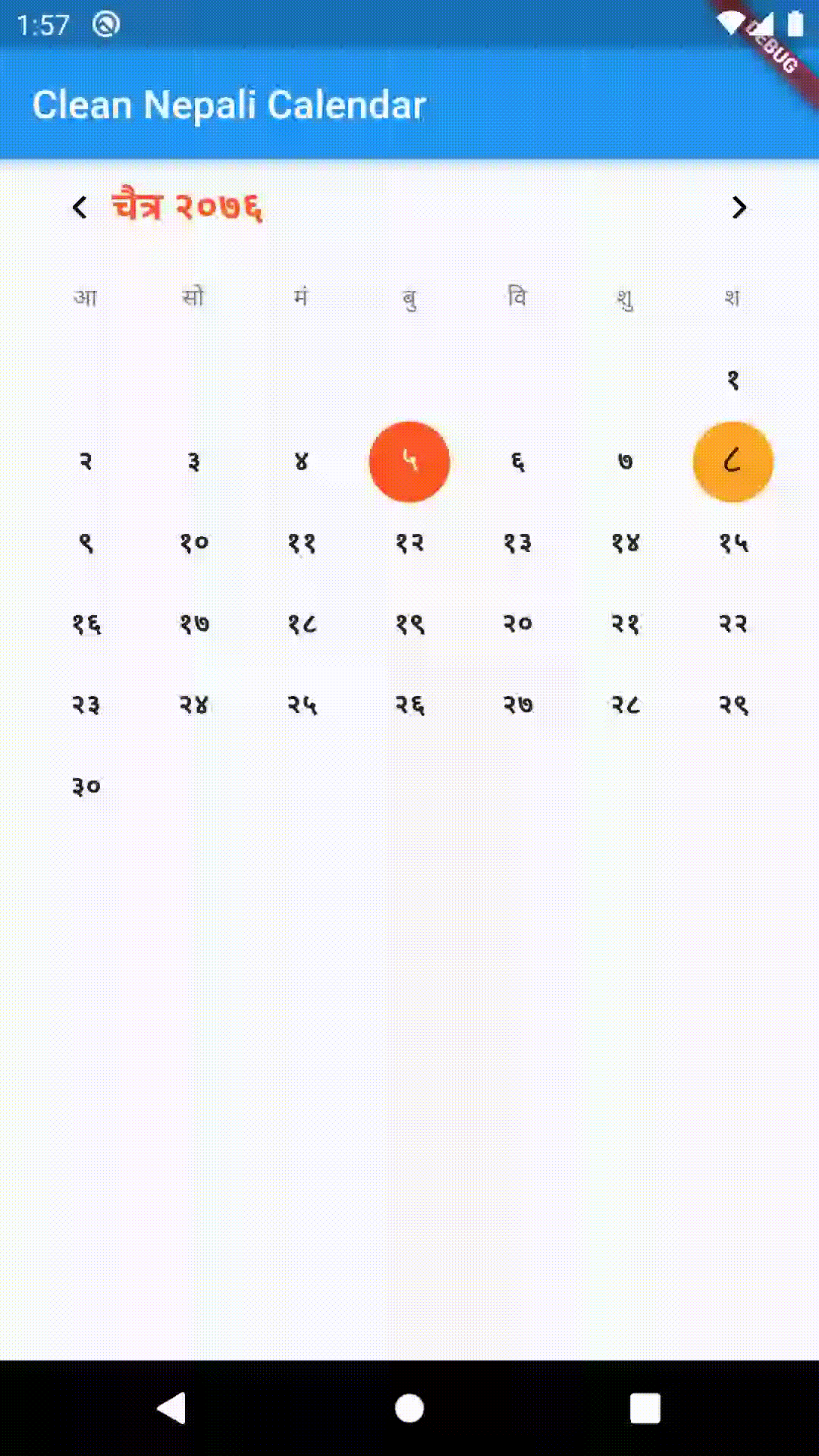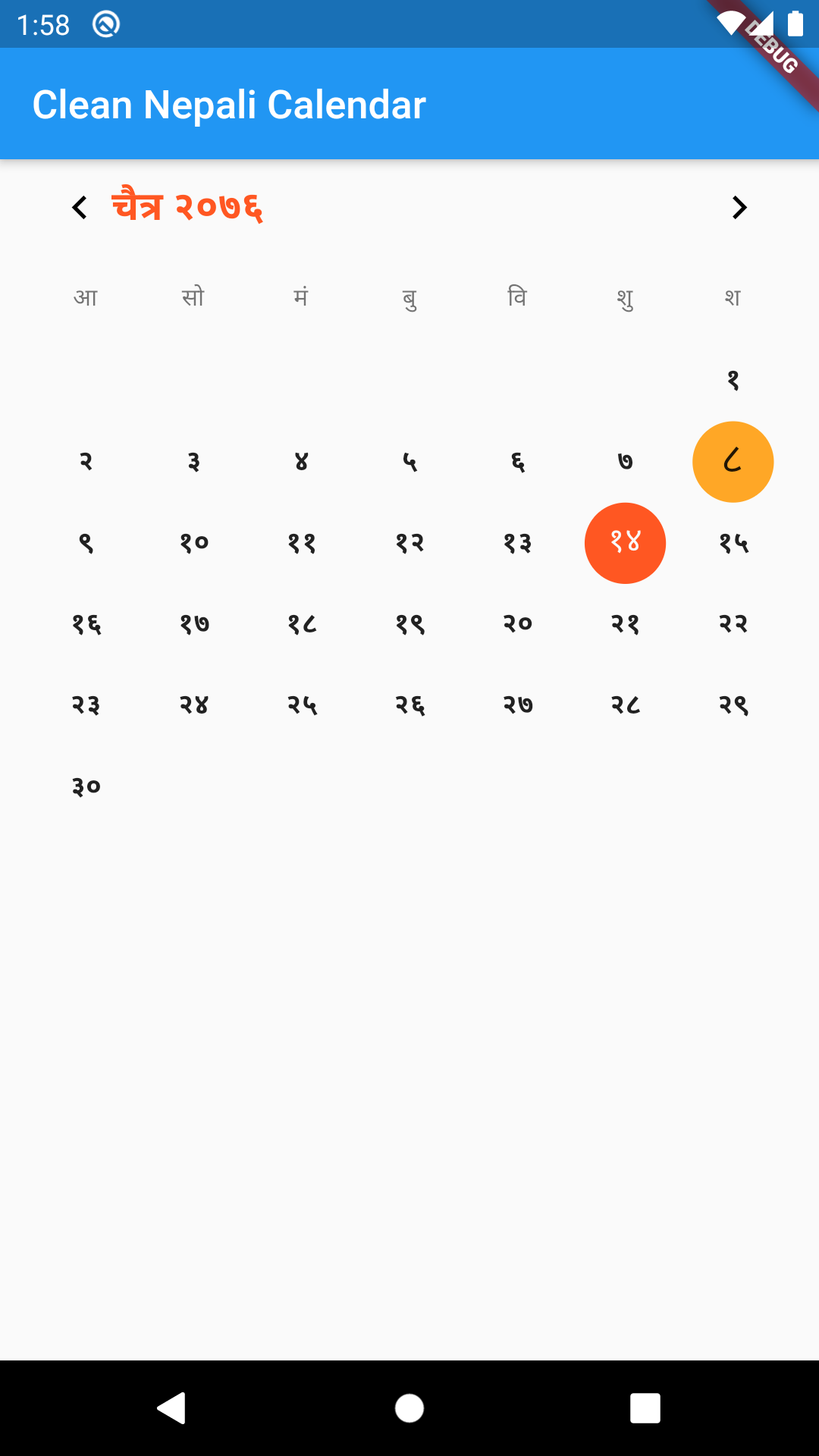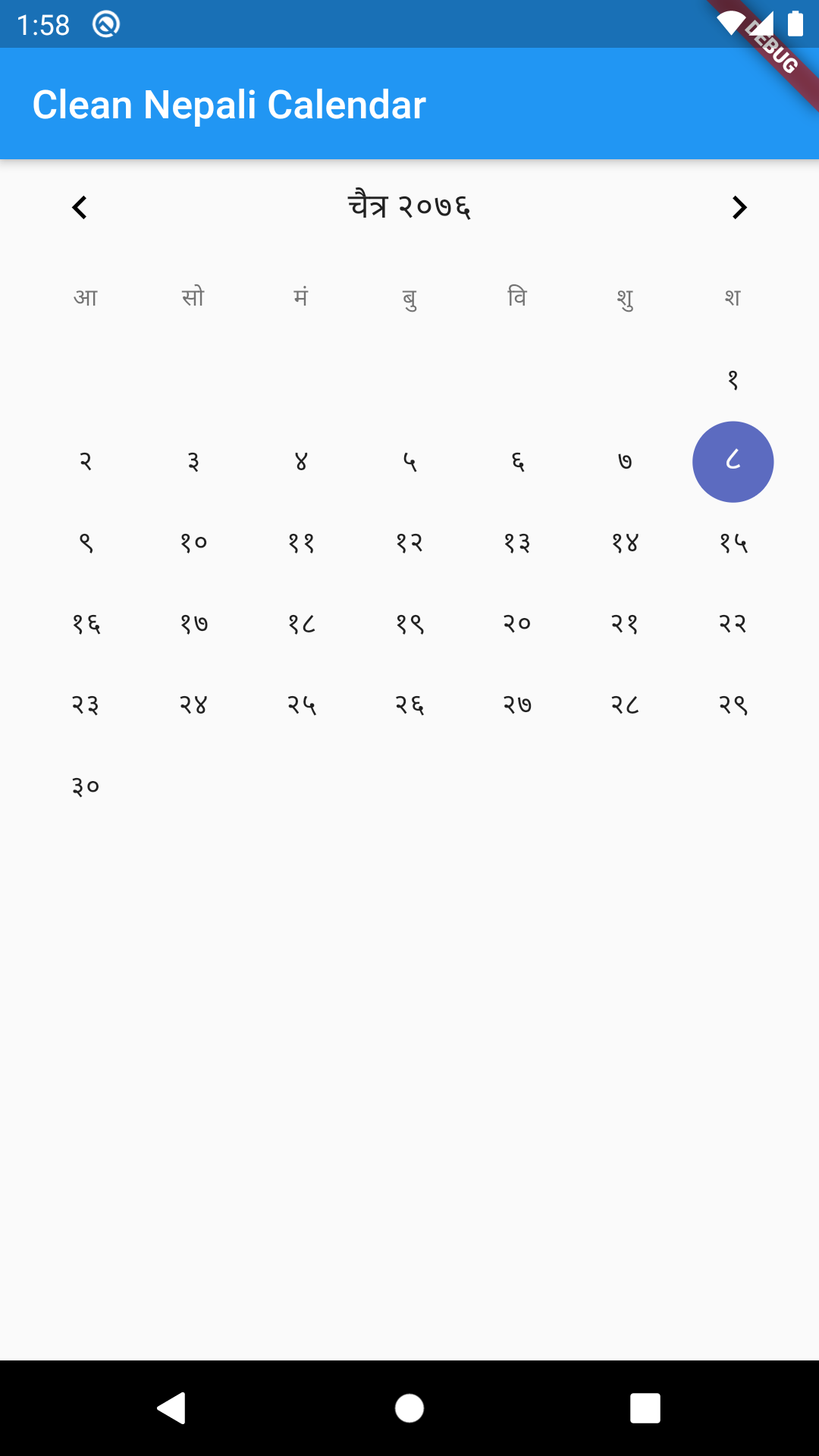Flutter尼泊尔历法插件clean_nepali_calendar的使用
Flutter尼泊尔历法插件clean_nepali_calendar的使用
Flutter包用于显示尼泊尔日历。灵感来自nepali_date_picker 和table_calendar。
高度可定制的、功能丰富的Flutter尼泊尔日历包。
 |
 |
 |
|---|
特性
- 广泛且易于使用的API
- 可以选择使用Unicode尼泊尔文或罗马文字
- 手势处理
- 指定可用日期范围
- 高度可定制
使用方法
安装
在pubspec.yaml文件中添加:
dependencies:
clean_nepali_calendar: latest
然后导入到你的项目中:
import 'package:clean_nepali_calendar/clean_nepali_calendar.dart';
创建并使用NepaliCalendarController实例化CleanNepaliCalendar小部件。这将直接工作:
[@override](/user/override)
void initState() {
super.initState();
_calendarController = NepaliCalendarController();
}
[@override](/user/override)
Widget build(BuildContext context) {
return CleanNepaliCalendar(
controller: _calendarController,
onDaySelected: (day){
print(day.toString());
},
);
}
查看示例项目获取更详细的信息。
示例代码
以下是完整的示例代码,展示了如何使用clean_nepali_calendar插件:
import 'package:clean_nepali_calendar/clean_nepali_calendar.dart';
import 'package:flutter/material.dart';
void main() => runApp(MyApp());
class MyApp extends StatelessWidget {
[@override](/user/override)
Widget build(BuildContext context) {
return MaterialApp(
title: 'Clean Nepali Calendar Demo',
theme: ThemeData(
primarySwatch: Colors.blue,
),
home: HomePage(),
);
}
}
class HomePage extends StatelessWidget {
final NepaliCalendarController _nepaliCalendarController = NepaliCalendarController();
[@override](/user/override)
Widget build(BuildContext context) {
final NepaliDateTime first = NepaliDateTime(2075, 5); // 设置起始日期
final NepaliDateTime last = NepaliDateTime(2079, 3); // 设置结束日期
return Scaffold(
appBar: AppBar(
title: Text('Clean Nepali Calendar'),
),
body: SingleChildScrollView(
child: Column(
crossAxisAlignment: CrossAxisAlignment.start,
children: <Widget>[
CleanNepaliCalendar(
headerDayBuilder: (_, index) {
return Align(
alignment: Alignment.topCenter,
child: Padding(
padding: const EdgeInsets.only(top: 5.0),
child: Text(
'_',
style: TextStyle(color: (index == 6) ? Colors.red : null),
),
));
},
headerDayType: HeaderDayType.fullName,
controller: _nepaliCalendarController,
onHeaderLongPressed: (date) {
print("header long pressed $date");
},
onHeaderTapped: (date) {
print("header tapped $date");
},
calendarStyle: CalendarStyle(
selectedColor: Colors.deepOrange,
dayStyle: TextStyle(fontWeight: FontWeight.bold),
todayStyle: TextStyle(fontSize: 20.0),
todayColor: Colors.orange.shade400,
renderDaysOfWeek: true,
highlightToday: true,
),
headerStyle: HeaderStyle(
enableFadeTransition: false,
centerHeaderTitle: false,
titleTextStyle: TextStyle(
fontWeight: FontWeight.bold,
color: Colors.deepOrange,
fontSize: 20.0),
),
initialDate: NepaliDateTime.now(),
firstDate: first,
lastDate: last,
language: Language.nepali,
onDaySelected: (day) {
print(day.toString());
},
dateCellBuilder: cellBuilder,
),
],
),
),
);
}
Widget cellBuilder(isToday, isSelected, isDisabled, nepaliDate, label, text, calendarStyle, isWeekend) {
Decoration _buildCellDecoration() {
if (isSelected && isToday) {
return BoxDecoration(
borderRadius: BorderRadius.circular(5),
color: Colors.blue,
border: Border.all(color: calendarStyle.selectedColor));
}
if (isSelected) {
return BoxDecoration(
borderRadius: BorderRadius.circular(5),
border: Border.all(color: calendarStyle.selectedColor));
} else if (isToday && calendarStyle.highlightToday) {
return BoxDecoration(
borderRadius: BorderRadius.circular(5),
border: Border.all(color: Colors.transparent),
color: Colors.blue,
);
} else {
return BoxDecoration(
borderRadius: BorderRadius.circular(5),
border: Border.all(color: Colors.transparent),
);
}
}
return AnimatedContainer(
padding: EdgeInsets.all(3),
duration: Duration(milliseconds: 2000),
decoration: _buildCellDecoration(),
child: Center(
child: Column(
children: [
Text(text, style: TextStyle(fontSize: 20, color: isWeekend ? Colors.red : null)),
Align(
alignment: Alignment.bottomCenter,
child: CircleAvatar(radius: 1)),
Align(
alignment: Alignment.bottomRight,
child: Text(nepaliDate.toDateTime().day.toString(), style: TextStyle(fontSize: 8, color: isWeekend ? Colors.red : null)),
),
],
),
),
);
}
}
更多关于Flutter尼泊尔历法插件clean_nepali_calendar的使用的实战教程也可以访问 https://www.itying.com/category-92-b0.html
更多关于Flutter尼泊尔历法插件clean_nepali_calendar的使用的实战系列教程也可以访问 https://www.itying.com/category-92-b0.html
当然,下面是一个关于如何在Flutter项目中使用clean_nepali_calendar插件的示例代码。这个插件用于显示和操作尼泊尔历法。
首先,确保你已经在pubspec.yaml文件中添加了clean_nepali_calendar依赖:
dependencies:
flutter:
sdk: flutter
clean_nepali_calendar: ^最新版本号 # 请替换为最新版本号
然后运行flutter pub get来安装依赖。
接下来,下面是一个简单的示例代码,展示了如何使用clean_nepali_calendar插件来显示尼泊尔历法:
import 'package:flutter/material.dart';
import 'package:clean_nepali_calendar/clean_nepali_calendar.dart';
void main() {
runApp(MyApp());
}
class MyApp extends StatelessWidget {
@override
Widget build(BuildContext context) {
return MaterialApp(
title: 'Flutter Nepali Calendar Demo',
theme: ThemeData(
primarySwatch: Colors.blue,
),
home: NepaliCalendarScreen(),
);
}
}
class NepaliCalendarScreen extends StatefulWidget {
@override
_NepaliCalendarScreenState createState() => _NepaliCalendarScreenState();
}
class _NepaliCalendarScreenState extends State<NepaliCalendarScreen> {
NepaliDateTime? selectedDate;
@override
Widget build(BuildContext context) {
return Scaffold(
appBar: AppBar(
title: Text('Nepali Calendar Demo'),
),
body: Center(
child: Column(
mainAxisAlignment: MainAxisAlignment.center,
children: <Widget>[
if (selectedDate != null)
Text(
'Selected Date: ${selectedDate!.toReadableString()}',
style: TextStyle(fontSize: 20),
),
SizedBox(height: 20),
Expanded(
child: NepaliCalendar(
onDateSelected: (NepaliDateTime date) {
setState(() {
selectedDate = date;
});
},
initialSelectedDate: selectedDate ?? NepaliDateTime.now(),
),
),
],
),
),
);
}
}
在这个示例中,我们创建了一个简单的Flutter应用,其中包含一个尼泊尔日历。当用户选择日期时,日期会显示在日历下方的文本中。
关键部分解释:
- 依赖引入:在
pubspec.yaml文件中添加clean_nepali_calendar依赖。 - 主应用结构:
MyApp类作为应用的入口,设置了主题和主页NepaliCalendarScreen。 - 日历页面:
NepaliCalendarScreen是一个有状态的组件,它包含一个NepaliCalendar小部件。 - 日期选择:通过
onDateSelected回调函数处理用户选择的日期,并使用setState更新UI。 - 显示选中日期:使用
Text小部件显示用户选中的日期。
请确保在实际项目中替换^最新版本号为clean_nepali_calendar插件的最新版本号。你可以通过访问pub.dev网站来获取最新版本信息。
这个示例提供了一个基础框架,你可以根据需要进一步自定义和扩展功能。







